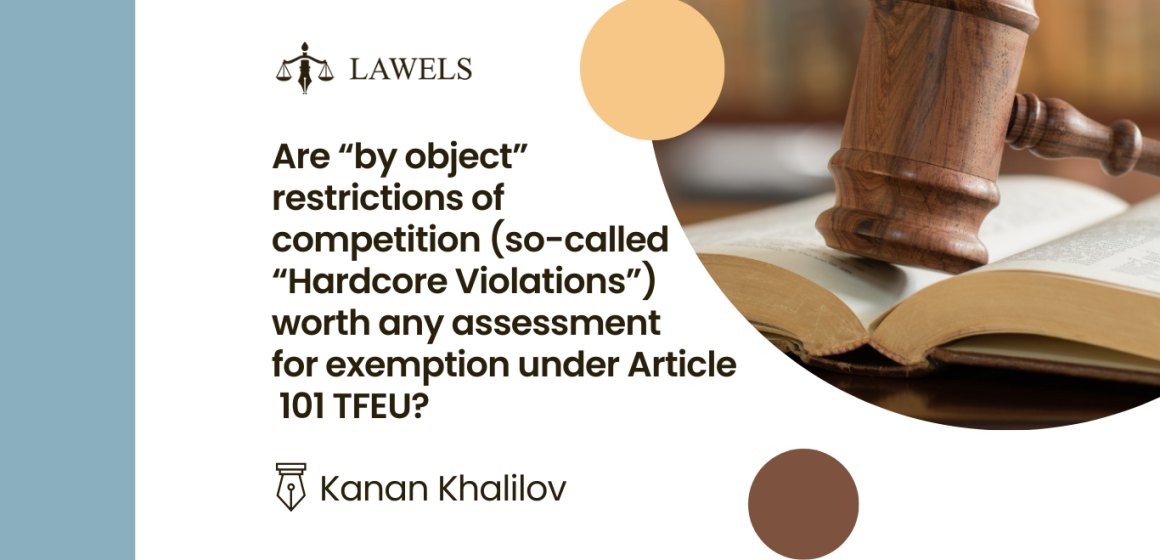EU Competition Law differentiates the agreements which can restrict, prevent or distort the competition by their object and effect. This approach has been employed in order to avoid the need to prove the anti-competitive effects of some categories of agreements which are the most impediment to effective competition by its object.[1] Nevertheless, according to the CJEU, even restricting competition “by object” arrangements can be justified under Article 101 (3) exclusion clause. However, it has been very much debated whether such concerted practices may indeed generate efficiency benefits worth weighing against the anti-competitive effects or if it is just a losing battle.[2]
In Cartes Bancaires, the CJEU concluded that certain types of arrangements are so harmful to the competition that their actual harms are not needed to be assessed.[3] These are cases where the quantity, price or quality of the goods and services have deteriorated to a great extent which makes them very unlikely to not have any effect on the proper functioning of the market.[4] It is not by accident that, following the Court’s decision, the EU Commission issued a Guidance on restrictions of competition by object detailing which agreements restricting competition by an object may benefit from the Commission’s De minimis Notice. These agreements or practices have been classified as “hardcore” restrictions on the competition by various prior Commission documents. According to the Guidance, the agreements restricting competition by an object which are presumed to have a negative effect on the market may not even benefit from the De Minimis Notice’s 5% market share threshold.[5] The CJEU in various cases have identified different types of agreements such as fixing prices[6], sharing markets[7], quotas[8], and rigging bids[9] which are inevitable to have repercussions on the market, therefore an analysis of the actual effects is needless to carry out. Besides them, the Commission has also prohibited information sharing on future prices, output, collective boycott agreements, and restrictions on the parties’ ability to carry out R&D or use their own technology for further R&D.[10] EU Horizontal Guidelines also state that those coordinations between companies about the intended prices and the quantity of the goods which may put the unassociated firms at a competitive disadvantage are considered by object restraints on the competition. In the Court’s view also, if the information exchange between the firms leads to the coordination of their decisions which are supposed to be taken independently regarding the pricing, the quantity produced is the restriction by the object.[11]
From an economic perspective, this distinction, however, is problematic. By differentiation between the restriction “by object” and “by effect”, the EU Courts and Commission do not take into account the real-life consequences of restriction “by object” agreements or practices. Therefore, making such a distinction between said arrangements itself is questionable. As we know, competition law requires a trade-off between the economically justifiable solution and legal certainty, therefore it is always sought after balancing these two competing interests by both lawmakers and jurists. By determining some agreements and practices as having “by object” restrictions on the competition, EU Courts and the Commission are aimed at creating legal certainty for the firms in order to deter them from getting engaged in such conduct or to include such arrangements in their relationships. Given that these firms are aware of the difficulty or practical impossibility of justifying them under Article 101 (3) either, therefore trying to avoid them to the greatest extent possible,[12] this aim seems to be achieved. For example, price-fixing cartels are classic examples of “by object” restrictions on the competition. Nevertheless, in lieu of labelling them as “by object” restriction from the surface, conducting a thorough economic analysis could prove that the price is not actually above the competitive level, so no competition concern is present. Moreover, a large number of buyers and the tendency to cheat among the cartel members might make such a practice ineffective.
However, the costs of conducting such a comprehensive analysis itself are probably higher in comparison with the false convictions (Type I errors), therefore it is still justifiable to label some sorts of conduct as having “by object” restrictions on the competition in order to avoid costly effects-based analysis. This handicap might be overlapped by requiring the evidence of actual price effect on the market. CJEU in its Architectes Belges decision has established that the minimum recommended price for certain services in some professions might also be perceived as the coordination of their behaviour in the market.[13] However, as empirical evidence supports, especially in liberal professions where there are a large number of service providers, the sustainability of such cartels is a difficult task.[14] It is always in the best interest of members of such cartels to cheat on the price. Therefore, it is said in the economic literature that these arrangements contain the seeds of its self-destruction. In contrast, CJEU does not take into consideration the actual effects of such arrangements once it has been proved that firms have colluded on the price, and gives trivial importance to such effect only in the stage of determination of the fine imposed.[15]
Labelling these agreements and practices as “hardcore” violations or “by object” restrictions on the competition, however, is not the end of the story. These concerted practices fall under the scope of Article 101 (1) prohibition. However, as CJEU concluded in its GSK decision, all agreements irrespective of their “by object” or “by effect” nature may theoretically benefit from the exemption under Article 101 (3) individually or from block exemptions if their pro-competitive effects outweigh their anti-competitive results.[16] The agreements listed in the block exemptions are assumed to satisfy the criteria defined by Article 101 (3) automatically. If not, each agreement must be analysed individually if it fulfils the four conditions of Article 101 (3): first, the agreement concerned must contribute to improving the production or distribution of the goods in question, or to promoting technical or economic progress; second, consumers must be allowed a fair share of the resulting benefit; third, it must not impose on the participating undertakings any restrictions which are not indispensable; and, fourth, it must not afford them the possibility of eliminating competition in respect of a substantial part of the products in question.[17] Unlike the Article 101 (1) violation, the defendant carries the burden of proof of demonstrating that the agreement at stake satisfies the aforementioned conditions.[18] The Commission should also thoroughly examine the evidence provided by the party prior to making a decision.[19] Even though the Court has opened the door for the possibility of the “by object” restriction to satisfy those conditions, this is naturally a far-fetched task for the defendant companies, since “by object” restraints are presumed to be illegal and are very unlikely to satisfy four cumulative[20] conditions of Article 101 (3). From an economic perspective, the over-inclusive presumption of illegality and not taking into account the possible pro-competitive effects of such practices, however, are fatal. As the economics of information adopts, exchanging information among the firms may also generate economic benefits for society: it might facilitate the coordination between the rival firms and prevent them from making duplicative investments in the evaluation of the market conditions which is pure waste.[21] Therefore, before reaching any conclusion, a careful assessment of the pro-and anti-competitive effects of the agreement or the practice of the information exchange should be conducted.[22]
Furthermore, the Commission itself has recognized the importance of case-by-case analysis of each agreement in its Fatty Acid decisions. On the contrary, information sharing might also be completely harmless in certain instances (for example, UK Tractor Cases[23], or European Wastepaper Information Service[24]).[25] Hence, the prohibition should only be applied to the agreements which do not reveal any efficiency benefits for society after careful examination. Take the example of the US Antitrust approach to tacit collusion: information exchange is not regarded as a violation per se unless the direct effect on the prices is proved.[26]
Citation:
[1] Case C-8/08, T-Mobile EU:C:2009:110, Kokott AG, para. 43; Case C-345/14, EU:C:2015:784 para. 20
[2] Roger 210
[3] Case C-67/13, P Groupement des Cartes Bancaires v. Commission, ECLI:EU:C:2014:2204.
[4] Roger 210
[5] Commission Notice on agreements of minor importance, [2001] O.J. C 368/13
[6] Case 123/83 Bureau National Interprofessionnel du Cognac (BNIC I) v. Guy Clair [1985] ECR 391
[7] Case 41/69 ACF Chemiefarma NV v. Commission [1970] ECR 661, para. 128
[8] Case T-142/89 Usines Gustave Boël SA v. Commission (Welded Steel Mesh) [1995] ECR II-867, 871
[9] Case T-29/92 Vereniging van samenwerkende prijsregelende organisaties in de bouwnijverheid (SPO I) and others v. Commission [1995] ECR II-289.
[10] Guidance on restrictions of competition ‘by object’ for the purpose of defining which agreements may benefit from the De Minimis Notice, Commission Staff Working Document, 25.6.2014, SWD(2014) 198 fina
[11] Case C-286/13 P Dole v. Commission, ECLI:EU:C:2015:184.
[12] D. Bailey, ‘Reinvigorating the Role of Article 101(3) Under Regulation 1/2013’ (2016) 18(1) Antitrust LJ 111
[13] Roger 216
[14] Stephen F (1993), ‘Effects of Deregulation in Professional Services Markets: Scottish Conveyancing Markets 1984–1989’ Strathclyde Papers in Economics no. 93/9
[15] Case C-8/08 [2009] ECR I-4529, paragraph 31
[16] Case T-168/01, GlaxoSmithKline Services Unlimited v Commission [2006] ECR II-2969
[17] Ibid. para 234
[18] Joined Cases 43/82 and 63/82 VBVB and VBBB v Commission . . . paragraph 52
[19] Consten and Grundig v Commission . . . 347
[20] Joined cases 43/82 and 63/82 VBVB and VBBB v. Commission [1984] ECR 19, para. 61
[21] Roger 217
[22] Nitsche R, von Hinten-Reed N (2004), Competitive Impacts of Information Exchange (Charles River Associates)
[23] Case IV/31.370 & IV/31.446 UK Agricultural Tractor Registration Exchange [1992] O.J. L 68/19;
[24] European Wastepaper Information Service [1987] O.J. C 399/7
[25] Roger 217
[26] Roger 218
The articles on the LAWELS platform are not, nor are they intended to be legal advice. You should consult a lawyer for individual advice or assessment regarding your own situation. The article only reflects the views of the author.


